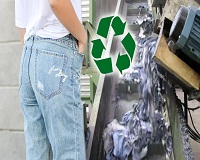"Sustainability, the buzzword in consumer goods right now, is doubly important for the fashion industry. Lindsey Tramuta, in the February issue of Fortune, reveals the industry, in the last 15 years, has doubled its production, adding to the already sizable problem of clothing waste. As the Secondary Materials and Recycled Textiles Association notes, around 85 per cent of discarded apparel in the US ends up in landfills even though 95 per cent of it can be recycled. Issues related to production ranging from vast amounts of water used to grow and process virgin cotton, to pesticides and the hazardous chemicals used in dyes add to woes."
 Sustainability, the buzzword in consumer goods right now, is doubly important for the fashion industry. Lindsey Tramuta, in the February issue of Fortune, reveals the industry, in the last 15 years, has doubled its production, adding to the already sizable problem of clothing waste. As the Secondary Materials and Recycled Textiles Association notes, around 85 per cent of discarded apparel in the US ends up in landfills even though 95 per cent of it can be recycled. Issues related to production ranging from vast amounts of water used to grow and process virgin cotton, to pesticides and the hazardous chemicals used in dyes add to woes.
Sustainability, the buzzword in consumer goods right now, is doubly important for the fashion industry. Lindsey Tramuta, in the February issue of Fortune, reveals the industry, in the last 15 years, has doubled its production, adding to the already sizable problem of clothing waste. As the Secondary Materials and Recycled Textiles Association notes, around 85 per cent of discarded apparel in the US ends up in landfills even though 95 per cent of it can be recycled. Issues related to production ranging from vast amounts of water used to grow and process virgin cotton, to pesticides and the hazardous chemicals used in dyes add to woes.
Recycling to improve sustainability
The issues of the extremely low wages paid to farmers, textiles workers and those involved in making the end-product along with their sub-human working conditions are also a matter of concern for the industry.
Few mainstream brands are tackling these problems quite head on as Patagonia—the trendy outdoor brand known for its down jackets. The brand, since its inception in 1973, has been outspoken on environmental issues, and has practiced what it preaches. The brand works with its design team to make its clothes sustainable.Around 70 per cent of its product line is made using recycled or renewable fiber.
Aiming for carbon neutrality by 2025
Patagonia aims to be carbon neutral by 2025, including its entire supply chain and company-operated retail. Its eventual goal is to be carbon positive and capture more carbon than it emits. Some of the ways the company plans to do this include: sourcing carbon-positive cotton from India, which the farmer can use to receive carbon rebates from the Indian government; increasing the amount of recycled materials in its products; and investing in renewable energy.
carbon than it emits. Some of the ways the company plans to do this include: sourcing carbon-positive cotton from India, which the farmer can use to receive carbon rebates from the Indian government; increasing the amount of recycled materials in its products; and investing in renewable energy.
And it’s not just established brands like Patagonia that are trying to shrink their environmental footprint. The ecological impact of the fashion industry has inspired a swath of startups to imagine a better way of doing things. Children’s wear brand Art+Eden uses organic cotton—made without pesticides—and dyes.
Sustainability as a part of CSR
Sustainability is also emerging as an important aspect of the corporate social responsibility (CSR) of brands. Patagonia, for instance, doesn’t view sustainability and making a profit as two separate things. The brand believes that they can run a healthy profitable business and also make the world a better place simultaneously.
Likewise Art+Edenuses some of its revenues to provide school meals in her native India. The brand’s primary focus is to grow its business successful then use these funds for the betterment of the society. It aims be venture-social, not a social-venture.











